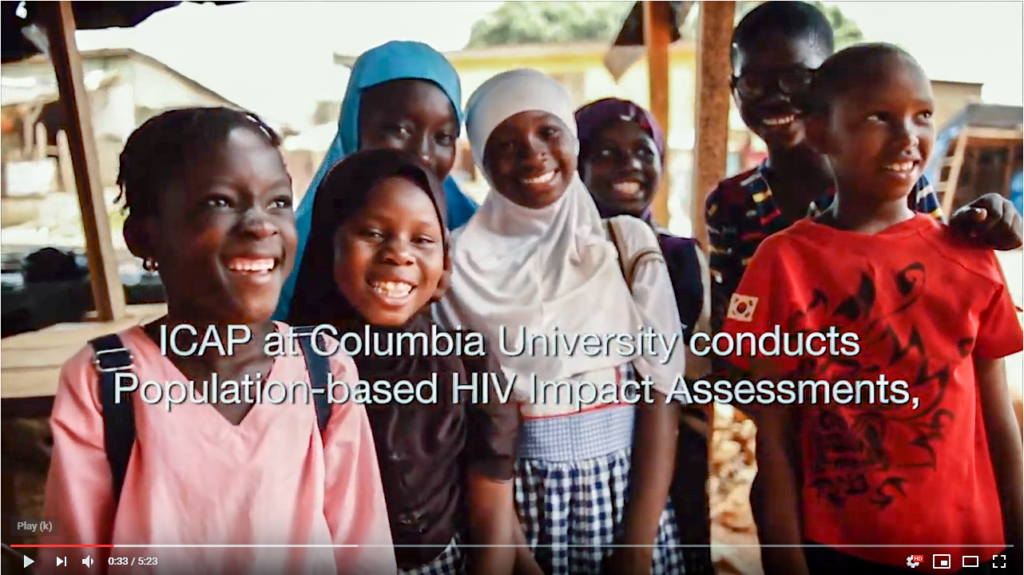ICAP at Columbia University has been awarded a $50 million grant from the U.S. Centers for Disease Control and Prevention (CDC) to conduct an extensive population survey effort in an array of countries and communities hardest hit by the global HIV epidemic.
The HIV Population Survey project will measure the reach and impact of HIV programs in countries designated as priorities by the U.S. President’s Emergency Plan for AIDS Relief (PEPFAR), with the goal of gathering the critical data those countries need to guide their HIV programs and investments.
ICAP will implement the PEPFAR-funded project in partnership with CDC under the leadership of health ministries and a stellar group of strategic partners.
“This major new award builds on the notable achievements of the Population-based HIV Assessment (PHIA) project, which ICAP has been implementing in 14 countries for the past five years,” said Wafaa El-Sadr, MD, MPH, MPA, ICAP’s global director and principal investigator of the project. “The PHIA series of household surveys, which were also funded by PEPFAR and conducted in partnership with CDC and ministries of health, constitute the first multi-country population-level measurements of progress toward global epidemic control targets. With the new initiative, ICAP aims to continue and expand the effort to present an even more detailed picture of the epidemic at this critical moment.”
____________
To learn more about the PHIA project, watch this short video produced by ICAP.
____________
The new HIV survey project, which will begin this year and is expected to last six years, will have two areas of focus. Firstly, the project will support conducting general population surveys in a number of PEPFAR-priority countries mostly located in sub-Saharan Africa. Upcoming surveys are planned in Eswatini, Lesotho, Malawi, Mozambique, Uganda, and Zimbabwe. These surveys will rapidly collect high-quality, actionable data—including incidence, prevalence, and viral load suppression—through household surveys of the general population.
Columbia University President Lee C. Bollinger recently visited Kenya and Rwanda, sites of PHIA Project surveys. Read more about what his delegation saw and learned in this article:
“Columbia University President Visits ICAP-Supported Programs in Kenya and Rwanda“
The second area of focus will involve surveys among key and priority populations. These populations—which include men who have sex with men, people who inject drugs, female sex workers, prisoners, and adolescent girls and young women—have been shown to bear a disproportionate burden of HIV. The information gathered through the surveys conducted among these groups will inform the response to their unique prevention and treatment needs.
In addition to data collection among general, key, and priority populations, the survey project will strengthen health ministry capacity to use data to inform national responses designed to reach global HIV targets.
“These surveys are important tools that policymakers, funders, and program managers need to assess both the progress they are making and the gaps that still remain, so they can make informed decisions about where to direct resources and how to shape programs,” said David Hoos, MD, MPH, who serves as project director for this initiative.
This project includes the following collaborating organizations: African Population and Health Research Center; African Society for Laboratory Medicine; Clinical Pharmacology Laboratory at the University of Cape Town; FHI 360; Frontier Science & Technology Research Foundation, Inc.; Institute for Global Health Sciences at the University of California, San Francisco; International Treatment Preparedness Coalition; Makerere University; Partnership for Supply Chain Management; PPD; and Westat.
More information about the PHIA project is available at phia.icap.columbia.edu
A global health leader since 2003, ICAP was founded at Columbia University with one overarching goal: to improve the health of families and communities. Together with its partners—ministries of health, large multilaterals, health care providers, and patients—ICAP strives for a world where health is available to all. To date, ICAP has addressed major public health challenges and the needs of local health systems through 6,000 sites across 30 countries. For more information about ICAP, visit: icap.columbia.edu







